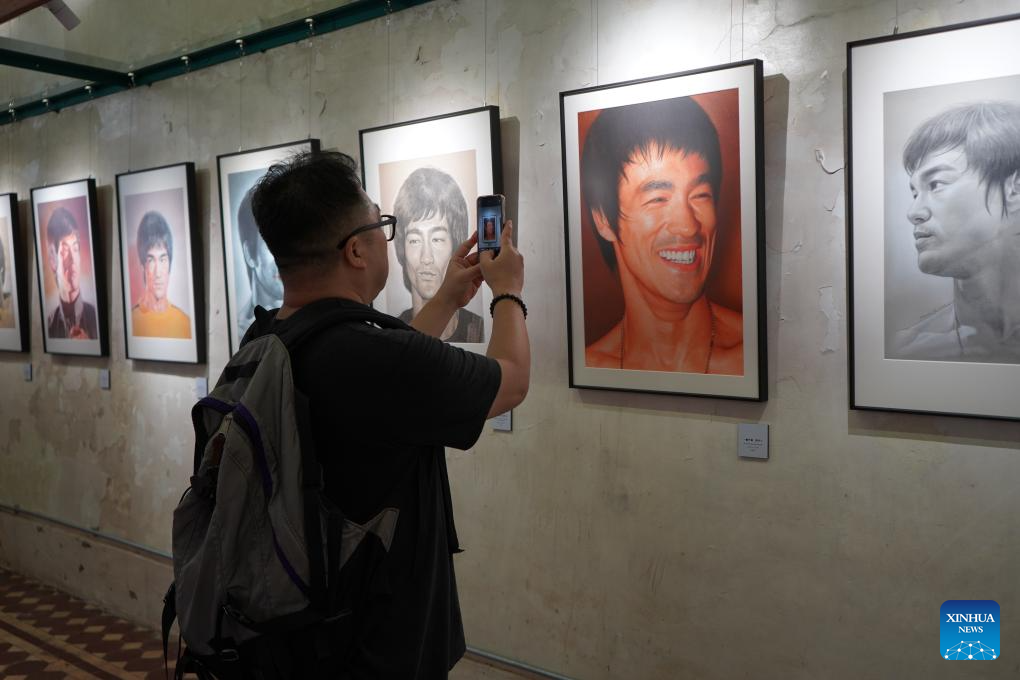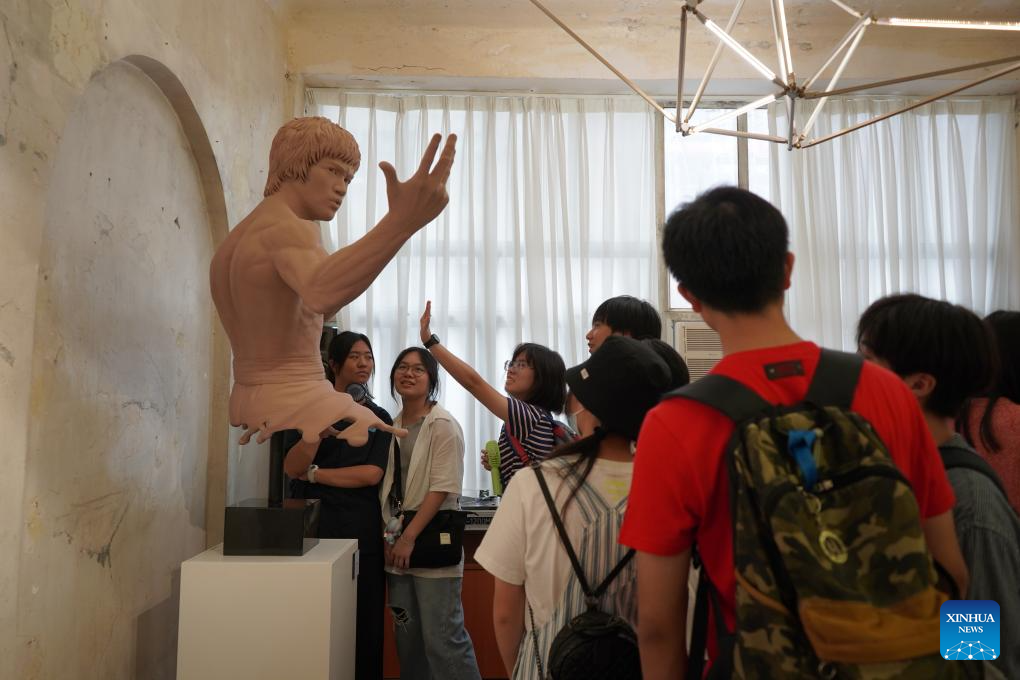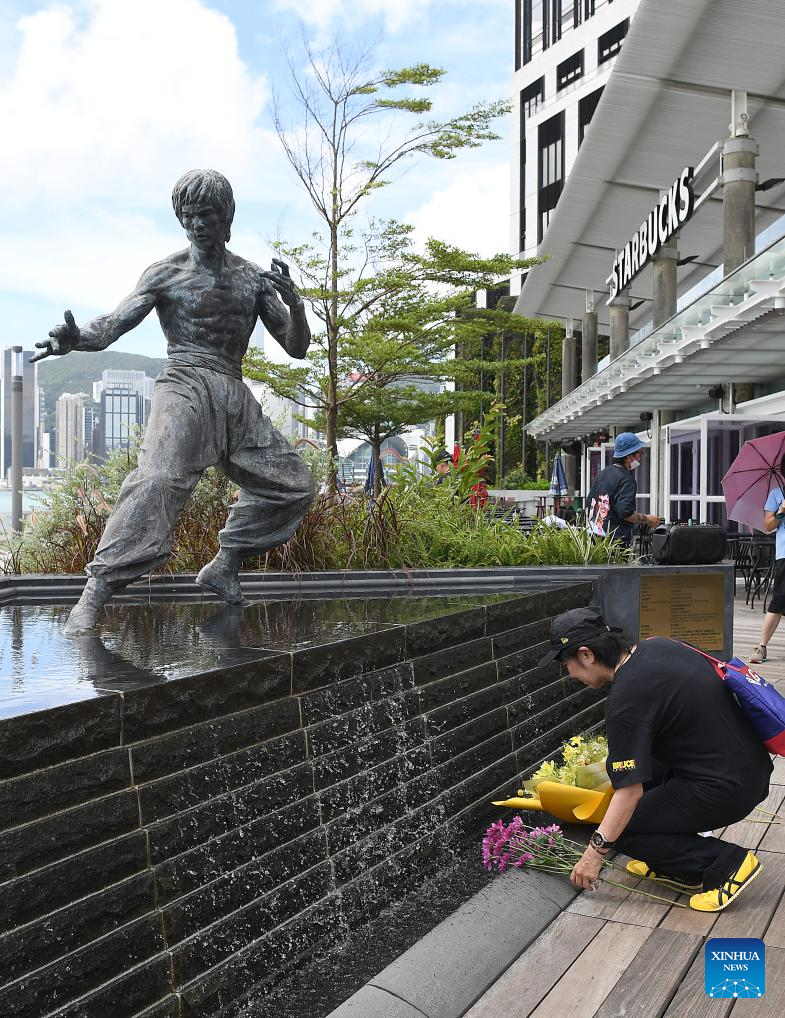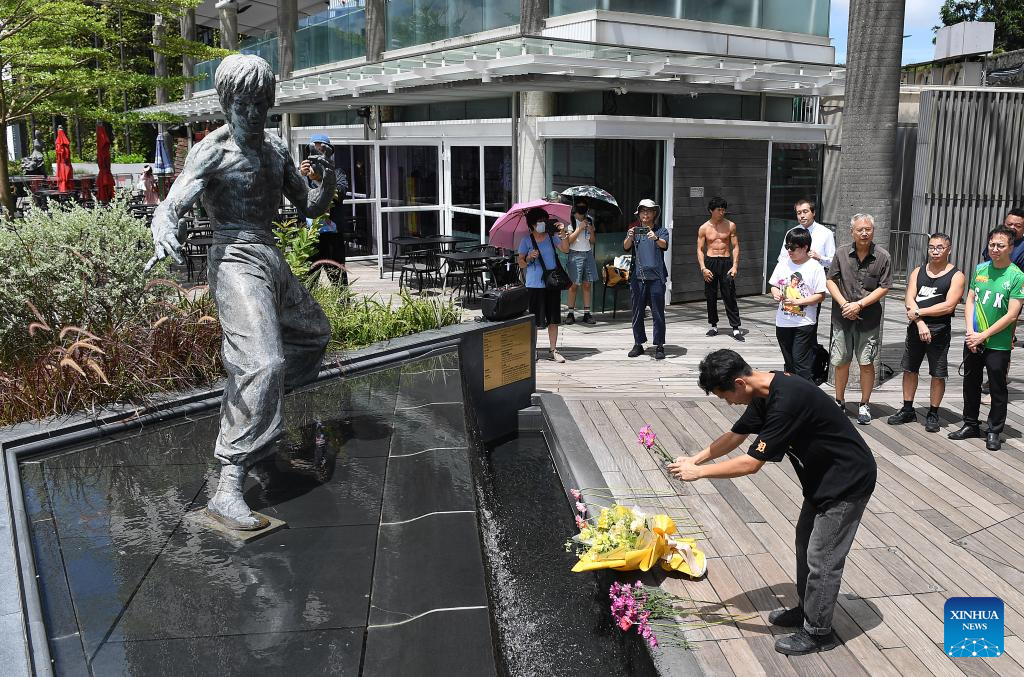
A man takes photos of an artwork at an exhibition commemorating Bruce Lee in Sham Shui Po of Hong Kong, south China, July 19, 2023. (Xinhua/Chu Mengmeng)
HONG KONG, July 20 (Xinhua) -- The man, the myth, the legend. Bruce Lee was all of these things and more. On July 20, 1973, the world lost one of its most iconic and influential figures when he passed away suddenly at the age of 32. Yet, 50 years later, his legacy lives on, larger than life and more resonant than ever.
Tourists flock to the Avenue of Stars along the Victoria Harbor waterfront in Tsim Sha Tsui, Hong Kong, a place of pilgrimage for Bruce Lee fans from around the world.
They pause at Lee's bronze statue to pay tribute to the martial arts master, often laying flowers at the base of the two-meter-high effigy that showcases Lee's classic Jeet Kune Do move, inspired by his final complete film, "Enter the Dragon."
Some pay their respects with a simple bow or a moment of silence, while others perform their own martial arts routines in front of the statue, channeling their inner Bruce Lee.
Shin Yong-woo from South Korea is one such fan who has traveled over 1,000 miles (1,600 km) to pay homage to his hero. He stood before the statue, dressed in black pants with his bare chest exposed, just like Lee frozen in frame by the monument. With a pair of nunchaku in his hands, Shin began his performance, twirling the weapons with fluid precision. A fan since he was nine years old, Shin credited Lee with inspiring him to learn Chinese martial arts.
Unlike Shin, who reveres Lee's Kung Fu as a physical art form, Patrick Weber from Britain is more drawn to the deeper meaning and philosophy behind Lee's teachings. Weber held a 25-year-old "Enter the Dragon" poster as he took photos in front of the bronze statue. He also brought a thick album that documents his more than 50-year journey as a fan.
Lee's legacy includes a collection of inspiring and insightful quotes that have resonated with people of all ages and backgrounds. "The key to immortality is first living a life worth remembering." "The successful warrior is the average man, with laser-like focus." "Do not pray for an easy life, pray for the strength to endure a difficult one."
"I love his philosophy on life," Weber said. "And the multiculturalism he portrayed was exactly what the world needed at the time."
Born in San Francisco in 1940, Lee spent much of his childhood and formative years in Hong Kong, where his father was a well-known Cantonese opera singer.
It was in Hong Kong that Lee began to study martial arts. His passion for Kung Fu and his innovative approach to martial arts quickly earned him a following in Hong Kong, where he starred in several successful films and TV shows. His fame and influence soon spread to other parts of China and Asia, inspiring a new generation of martial artists and popularizing Chinese culture and philosophy around the world.
As one of Hollywood's most influential Chinese American actors, Lee introduced Chinese martial arts and its underlying culture and philosophy to the world through his films, and even brought the term "Kung Fu" into the English language. His confident portrayal of Chinese culture in martial arts movies continues to inspire people decades later.
"He's so cool!" said Sophie Uekawa from Japan as she looked at the statue, reminiscing about her teenage years several decades ago. "In 1973, Bruce Lee's movies became a sensation in Japan when they were first released. The queues for his films were so long that they stretched for several blocks, and 'Enter the Dragon' played for more than a year in one cinema before it was taken."
In recent days, a series of commemorative events in Hong Kong have confirmed the enduring influence of the Chinese Kung Fu culture that Lee represented. The "Bruce Lee: A Timeless Classic" exhibition opened at the Hong Kong Heritage Museum, showcasing various books, stamps, and figurines related to the superstar from different eras. The museum also has a permanent exhibition introducing his life story.
Inside the exhibition hall, a wall of famous quotes presents Lee's philosophy: "Using no way as a way, having no limitation as limitation," "Success is a journey, not a destination," and more.
Wang Wei, who works in the education industry, included the exhibition as one of the stops for Chinese mainland students on their educational tour of Hong Kong.
"Bruce Lee is an important part of Hong Kong's pop culture and represents the Chinese spirit and character embodied by the people of Hong Kong," Wang said. "With a profound understanding of Chinese culture, he showcased the confidence of Chinese culture through Kung Fu."
The Bruce Lee Foundation is holding its first "Camp Bruce Lee" event in Asia at the Hong Kong Heritage Museum, where about 30 primary school students from Hong Kong are experiencing Jeet Kune Do and learning about the star through various art forms over a few days.
"This movie is about the history of Japanese imperialism invading China in the last century ..." Inside the museum, the guide points to a still from the movie "Fist of Fury" and introduces the plot to the young campers while explaining the national history. The still captures the moment when Lee's character Chen Zhen kicks down the "Sick Man of East Asia" sign in the movie. ■

People visit an exhibition commemorating Bruce Lee in Sham Shui Po of Hong Kong, south China, July 19, 2023. (Xinhua/Chu Mengmeng)

A fan pays tribute at Bruce Lee's bronze statue at the Avenue of Stars along the Victoria Harbor waterfront in Tsim Sha Tsui, Hong Kong, south China, July 20, 2023. (Xinhua/Chen Duo)

A fan pays tribute at Bruce Lee's bronze statue at the Avenue of Stars along the Victoria Harbor waterfront in Tsim Sha Tsui, Hong Kong, south China, July 20, 2023. (Xinhua/Chen Duo)



